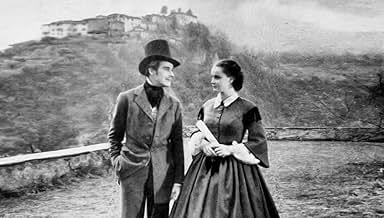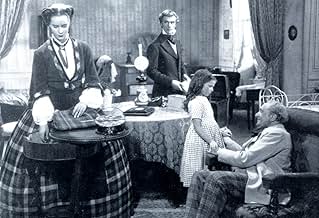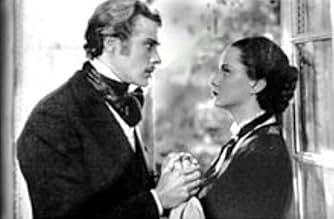PUNTUACIÓN EN IMDb
6,4/10
216
TU PUNTUACIÓN
Añade un argumento en tu idiomaA woman of humble origins who marries a nobleman in the mid-19th century. Unfortunately, the unstoppable force of their love hits an immovable object: his grandmother.A woman of humble origins who marries a nobleman in the mid-19th century. Unfortunately, the unstoppable force of their love hits an immovable object: his grandmother.A woman of humble origins who marries a nobleman in the mid-19th century. Unfortunately, the unstoppable force of their love hits an immovable object: his grandmother.
- Dirección
- Guión
- Reparto principal
Domenico Viglione Borghese
- Dina
- (as Viglione Borghese)
Emilio Baldanello
- Il dottore
- (sin acreditar)
Reseñas destacadas
"Little old-fashioned world" was a tremendous success when it was released in Fascist Italy in 1941. It is said that it was as huge in Italy as "Gone With The Wind" in America. It also started the career of Alida Valli (who starred years later in "The third man" and in Visconti's "Senso")as a movie star.
Having said that, very little of this past glory has stood the test of time. What remains today is some incredible and pompous period film, dull and unimaginative in spite of Valli's beauty and sensibility. Based on a novel that sets a melodramatic romance against a backdrop of major historical events, the story is set in the nineteenth century, during the Risorgimento era. Cut off by his family for marrying below his station, a young nobleman faces war fighting the Austrians and a different kind of war with a vengeful grandmother and neglected wife. Some people regard this film as a forerunner of Italian neorealism. They are dead wrong. "Piccolo mondo antico" reminds one constantly of heavy adaptations of novels as they were made in the 1930s. An established writer before turning to film director, Soldati is far from being Visconti. Let's do him justice by reading more of his novels and reviews.
Having said that, very little of this past glory has stood the test of time. What remains today is some incredible and pompous period film, dull and unimaginative in spite of Valli's beauty and sensibility. Based on a novel that sets a melodramatic romance against a backdrop of major historical events, the story is set in the nineteenth century, during the Risorgimento era. Cut off by his family for marrying below his station, a young nobleman faces war fighting the Austrians and a different kind of war with a vengeful grandmother and neglected wife. Some people regard this film as a forerunner of Italian neorealism. They are dead wrong. "Piccolo mondo antico" reminds one constantly of heavy adaptations of novels as they were made in the 1930s. An established writer before turning to film director, Soldati is far from being Visconti. Let's do him justice by reading more of his novels and reviews.
PICCOLO MONDO ANTICO (LITTLE OLD-FASHIONED WORLD), based on Antonio Fogazzaro's esteemed 1895 novel of the same title, is set in 19th Century Lombardy, then under Austrian domination. Like Manzoni's novel I PROMESSI SPOSI, the story is set into motion by the marriage of a young couple that meets opposition. The couple here is Franco and Luisa. Franco's grandmother, the Marchesa, is his only "parent." This cold-hearted, über-aristocratic matriarch won't permit her grandson to marry Luisa, the daughter of a government "funzionario." When he does so anyway, against her wishes, the fat old meanie disinherits him and does whatever she can to persecute the couple.
Franco becomes involved in the patriotic movement, the Risorgimento, to liberate Lombardy and other Italian states from foreign domination and work toward unification with the Kingdom of Piedmont and create a new Italy. Grandma, an entrenched conservative, condemns her grandson's political agenda and co-operates with the Austrians to harm him. Tragedy befalls the couple when their little daughter Ombretta accidentally drowns. Franco and Luisa are estranged. The film concludes with a remorseful grandmother trying to make amends, Franco and Luisa reconciling, and with Franco going off to the Crimean War.
Massimo Serato is a handsome and convincing presence as Franco; Alida Valli is even better as Luisa, especially in rendering her desperation after the death of her child. She won an Italian award for this performance. But it is Ada Dondini who steals the show as the wicked-witch Marchesa whenever she is on screen. The exterior photography by Arturo Gallea is particularly beautiful, with moody misty shots of Lake Como, boats on the lake, nearby estates and villages. There is a stark scene of high visual contrast toward the end which has Alida Valli going to a church, wearing a black shawl, in the wind-swept rainy background. This interestingly suggests a similar scene in Visconti's 1948 LA TERRA TREMA. All in all, this is a creditable movie and one of the key works from the Italian fascist era.
Franco becomes involved in the patriotic movement, the Risorgimento, to liberate Lombardy and other Italian states from foreign domination and work toward unification with the Kingdom of Piedmont and create a new Italy. Grandma, an entrenched conservative, condemns her grandson's political agenda and co-operates with the Austrians to harm him. Tragedy befalls the couple when their little daughter Ombretta accidentally drowns. Franco and Luisa are estranged. The film concludes with a remorseful grandmother trying to make amends, Franco and Luisa reconciling, and with Franco going off to the Crimean War.
Massimo Serato is a handsome and convincing presence as Franco; Alida Valli is even better as Luisa, especially in rendering her desperation after the death of her child. She won an Italian award for this performance. But it is Ada Dondini who steals the show as the wicked-witch Marchesa whenever she is on screen. The exterior photography by Arturo Gallea is particularly beautiful, with moody misty shots of Lake Como, boats on the lake, nearby estates and villages. There is a stark scene of high visual contrast toward the end which has Alida Valli going to a church, wearing a black shawl, in the wind-swept rainy background. This interestingly suggests a similar scene in Visconti's 1948 LA TERRA TREMA. All in all, this is a creditable movie and one of the key works from the Italian fascist era.
Yet another film about the Italian Risorgimento, a subject which I've always found fascinating given that I studied Italian history in my childhood! Despite the meticulous period detail of the production, the film's tone is an intimate one and, apart from the class struggle manifest in the narrative, is not overtly political either.
The acting by the two leads - Alida Valli and Massimo Serrato - is fine (the former in particular when, towards the end, she almost goes mad with grief over her little daughter's tragic death), but so is the supporting cast which includes such stereotypes as the jovial but perennially hungry chaplain and the harridan aristocratic matriarch, clinging to a fading way of life, who stands in the way of the young couple's happiness. However, some of the characters speak in a heavy dialect which - even to one who is fluent in the language as I am - is practically impossible to decipher!
The acting by the two leads - Alida Valli and Massimo Serrato - is fine (the former in particular when, towards the end, she almost goes mad with grief over her little daughter's tragic death), but so is the supporting cast which includes such stereotypes as the jovial but perennially hungry chaplain and the harridan aristocratic matriarch, clinging to a fading way of life, who stands in the way of the young couple's happiness. However, some of the characters speak in a heavy dialect which - even to one who is fluent in the language as I am - is practically impossible to decipher!
One of my fellow reviewers referenced Luchino Visconti's La Terra Trema from later in the 1940s in connection with one of the striking scenes in this film with the beautiful Alida Valli, but in another way this period literary adaptation seems to me a forerunner of Visconti's much later The Leopard.
It is like that film an exquisitely detailed recreation of the specific manners and eccentric characters in a sheltered aristocratic little world which is about to end with the momentous political changes of the Risorgimento and the unification of Italy.one scene in particular, where the family all get together to say the rosary after dinner though they are half asleep, reminds me of the scene early in The Leopard where the family in that film pray in their estate.
The movie as well as much of the rest of Mario Soldati's career are worth rediscovery.
Alida Valli makes a very sensitive and convincing appearance here, as the poor village girl who is discovered by a young dashing aristocrat (Massimo Serrato), an heir of a fortune, who marries her against his grandmother's will, an aging stagnating marchioness, who denounces both of them when they marry, like a stepmother of the very worst sort. Of course their love overcomes everything and even the overwhelming tragedy in the end, which occurs simultaneously with the liberation of Italy, the Risorgimento movement, with count Cavour as the leading politician unifying Italy. It's a very romantic novel, like an Italian "Gone with the Wind" with obvious bearings also on Alessandro Manzoni's "The Betrothed", while the film points forward to both Visconti's "La terra trema" and his "The Leopard" - the film could be seen as a twin version of "The leopard" but in Lombardy instead of Sicily, but the action here is more dramatic and more human. The cinematography is exquisite, the 1850s are reconstructed with minute and meticulous historical realism, especially concerning the costumes, and the music is excellent in its discretion. Mario Soldati was one of the great forerunners of Italian neo-realism and important for many great international epic films, and this was one of his first masterpieces while it also launched Alida Valli's career.
¿Sabías que...?
- CuriosidadesAnna Carena's debut.
- ConexionesReferenced in Nosotras las mujeres (1953)
Selecciones populares
Inicia sesión para calificar y añadir a tu lista para recibir recomendaciones personalizadas
Detalles
- Fecha de lanzamiento
- País de origen
- Idioma
- Títulos en diferentes países
- Mali starinski svet
- Localizaciones del rodaje
- Oria, Valsolda, Como, Lombardia, Italia(Villa and village streets)
- Empresas productoras
- Ver más compañías en los créditos en IMDbPro
- Duración1 hora 46 minutos
- Color
- Mezcla de sonido
- Relación de aspecto
- 1.37 : 1
Contribuir a esta página
Sugerir un cambio o añadir el contenido que falta

Principal laguna de datos
By what name was Tiempos pasados (1941) officially released in Canada in English?
Responde























